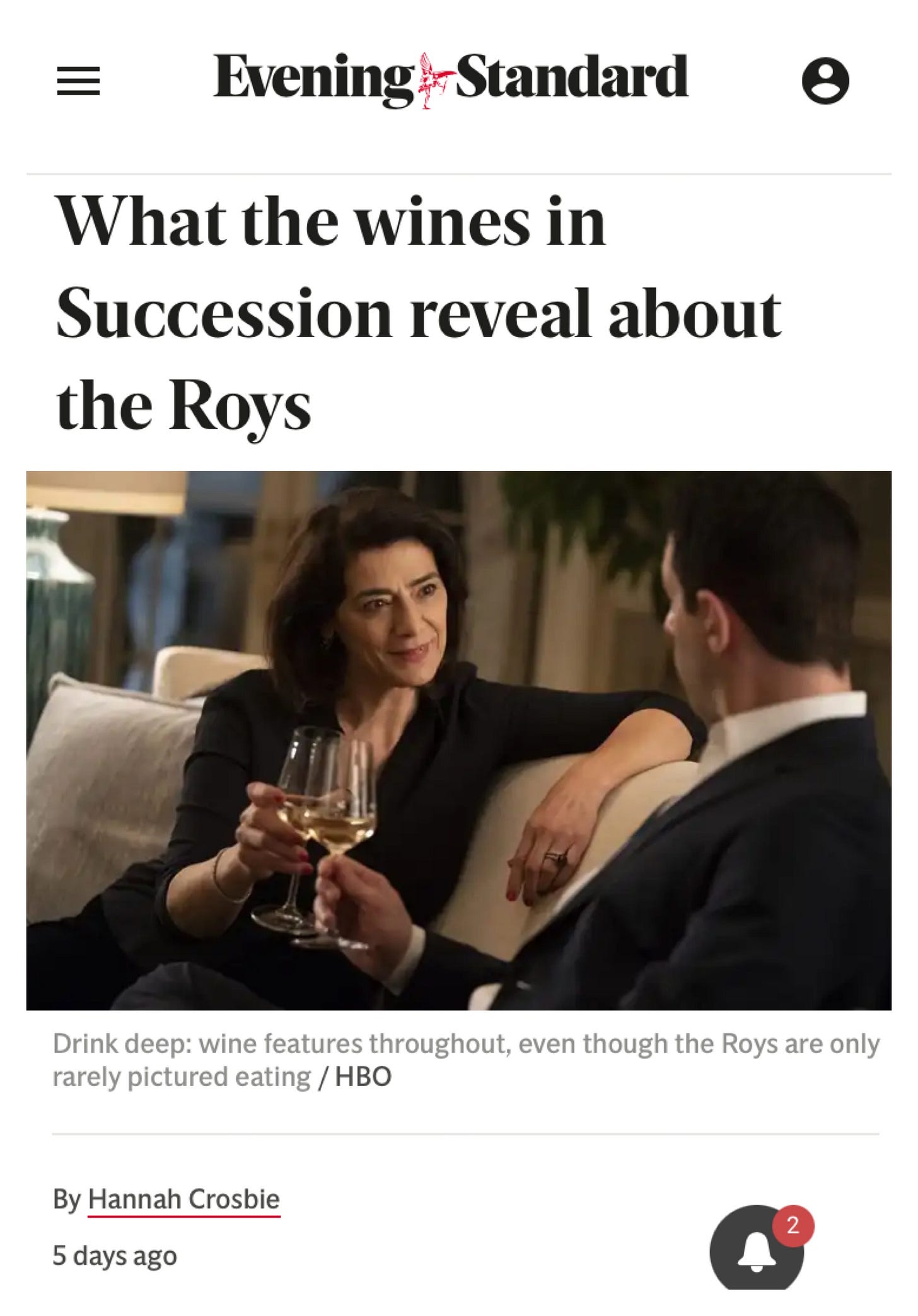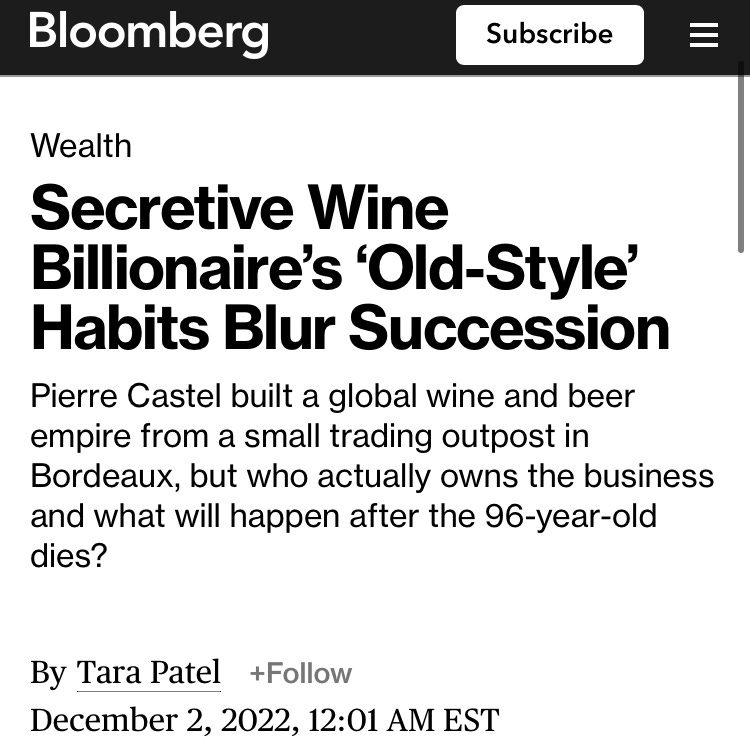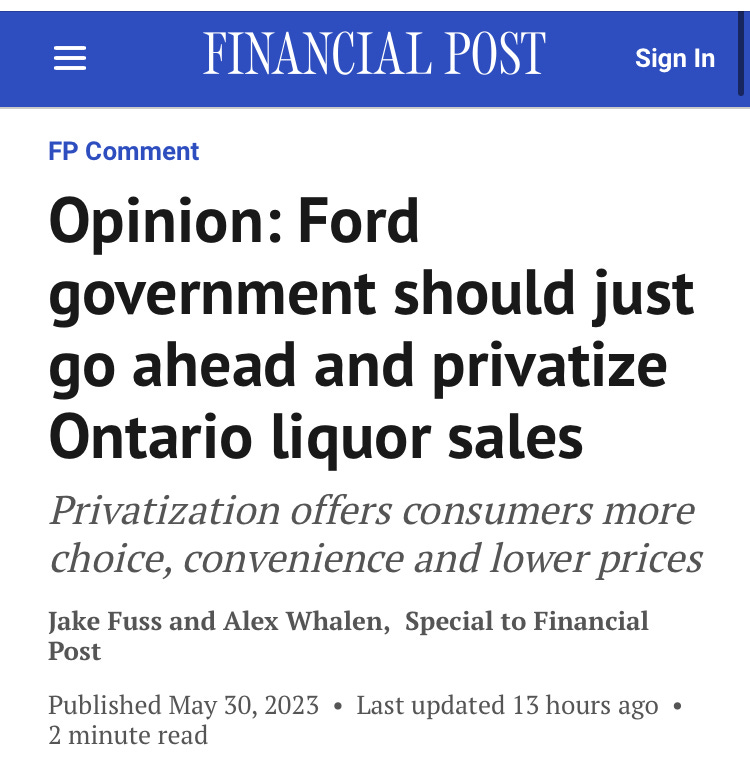Succession Wine
Wine and Wealth. In the Evening Standard’s What the wines in Succession reveal about the Roys, Hannah Crosbie writes about how the fictional Roy family drinks wine in HBO’s Succession.
From $80,000 wine to “Malbec morons”, cheap Prosecco to biodynamic Spätburgunder, wine punctuates every meeting, incites every infidelity, and underpins every interaction of HBO’s Succession…. Where for the average drinker, the celebratory opening of a special bottle is designated for life’s important moments, the Roys drink fine wine so often, any sense of celebration is abstracted into something meaningless.
The article goes on to provide the four most significant wine moments from the show, whose series finale had a record 2.9 million viewers. First is Connor’s hyper-decanted Burgundy scene: “I hyper-decant. You don’t hyper-decant? You’re just doing regular decanting?” Sidebar: decanting wine is meant to be slow and is used to separate the sediment from the liquid, particularly for red wines, which enhances the wine and allows it to breathe.
Next is the 1996 Pingus wine scene. Dominio de Pingus is a winery located in the Spanish region of Ribera del Duero, which was started in 1995 “but the whole of that vintage was lost at sea after a cargo accident, meaning the 1996, the second-ever vintage, is a seriously rare, even legendary wine,” selling for £1,000 (or nearly $1,700 CAD), which Kendall mistakenly opens ¯\_(ツ)_/¯.
Third is when Shiv and Tom drink an unidentified natural Spätburgunder (German Pinot Noir) with an “agricultural” bouquet.
Succession’s not-so-subtle dig at natural wine was a much-loved scene for the industry, whether it affirmed personally held beliefs or playfully poked fun at the sensibilities of the natty brigade.
And lastly, the pre-election party scene with Champagne-loving Connor, who drinks everything from Jacquart, Veuve Clicquot, and Laurent Perrier throughout the series. But during Tom’s pre-election night party, Connor’s luxe cuvée pick is Piper Heidsieck: “the Champagne of choice for both the Cannes Film Festival and the Oscars. Once again, the idea of affluence and status runs deep.”
Succession Wine IRL. In Bloomberg’s Secretive Wine Billionaire’s ‘Old-Style’ Habits Blur Succession, Tara Patel wrote about 96-year-old Pierre Castel and his global wine empire that apparently doesn’t have a succession plan or an organizational chart.
Castel has been the face of the $4.6B business, Castel Freres, one of the world’s largest wine traders — started as a family produce and wine business by Castel and four of his eight siblings in 1949, and now selling about 500 million bottles of wine a year — while also owning 500 Nicolas wine stores across France.
But there’s little, if any, information about how his vast organization is run, its ownership and who would take over from him — at least four of his nephews have key roles at the top of the group, and he also has a daughter.
The article says that people familiar with Castel’s thinking believe his succession plan was prepared with the intention for the group to remain family-owned and independent, just as it started, but there seems to be no formal documentation of that plan. Castel’s daughter Romy is also in the wine biz and owns Chateau Cavalier, which specializes in rosé wine and is certified for sustainable winegrowing by Terra Vitis.
The Case for Privatization. In an opinion piece for the Financial Post, Fraser Institute economists Jake Fuss and Alex Whalen write that the Ford government should just go ahead and privatize Ontario liquor sales.
In Ontario, beverage alcohol retail and distribution is run by the Liquor Control Board of Ontario (LCBO), a crown corporation with revenue of $7.18 billion in its fiscal year 2021, with 33% of that being sales from wine, according to the LCBO’s most recent annual report. Fuss and Whalen write that with the LCBO running Ontario’s government liquor stores, there isn’t true competition. They go on to make their case using Alberta as a model, whose government introduced privatization for liquor sales in 1993, which Fuss and Whalen say resulted in more products and lower prices.
Liquor privatization would give Ontario’s liquor consumers more stores, greater convenience, wider product selection and, potentially, lower prices. There’s no good reason for the Ford government not to emulate Alberta’s privatized liquor model.
For more info on Ontario’s alcohol retail model check out Ontario’s Wine Retail Landscape and What’s the Deal with Wholesale Pricing?




Is the Wine Store (or whatever it's called) Crown owned? Also, as a non-Crown corp. how did Loblaws/No Frills get exclusivity on wine/beer sales? Also, also, I heard that 7-11 might be granted a license to sell alcohol in Ontario. Is that true? And will they stock anything besides Colt 45 and Olde English?
First, what was the horrible red Tom was trying to push at his party? Second, how do YOU feel about privatizing Elsie?